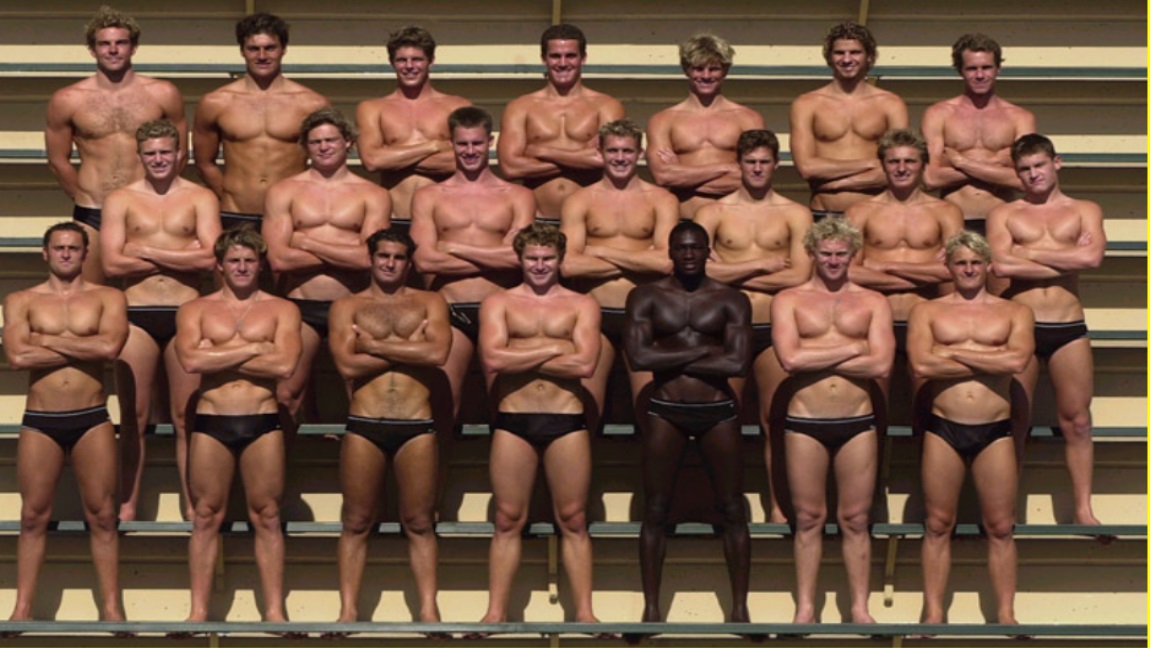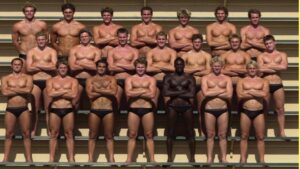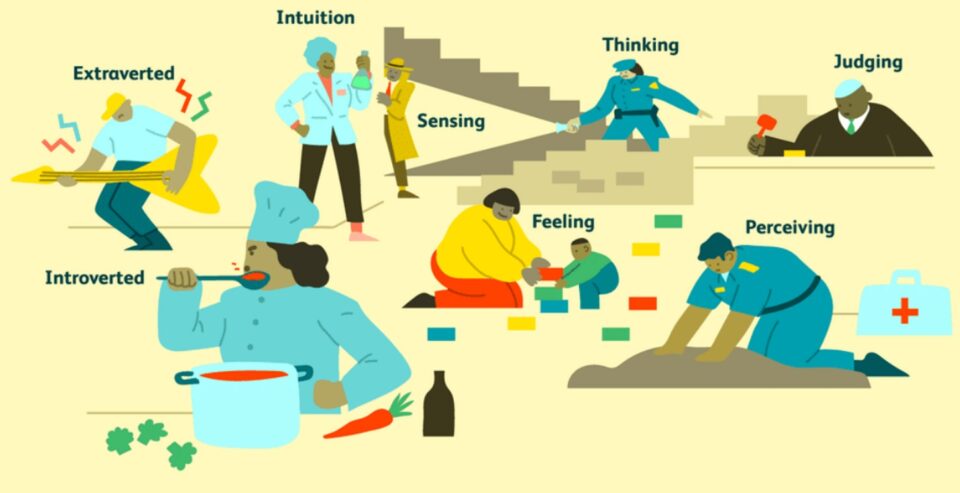Are we color blind?

Race Matters…
Rev. Scott W. Alexander, Preaching
UCN
MLK Sunday
January 14, 2024
I’d like to begin our Martin Luther King reflection this morning by having you all to look at this picture…and tell me what you see?
[PICTURE OF COLLEGE SWIM TEAM IS PROJECTED UP ON THE SCREEN]

Besides a college-age swim team of 22 fit/young males, what do you see?
[SCOTT PAUSES TO GIVE THE CONGREGATION A FEW SECONDS TO VISUALLY TAKE IN THE PICTURE]
Well…if you’re like me – first off (AND ALMOST IMMEDIATELY) – your “eye” sees the ONE black swimmer (standing out) in the midst of a bunch of white swimmers. There is (to my well-trained American eye anyway) an unavoidable (and powerful) “racial component” to this photograph. I don’t see how anyone living in America (in this highly racialized – and in many ways painfully divided -- society of ours) would fail to immediately see the one black guy (identical to all the other fit/young swimmers except for his rich/dark skin color) sticking out amidst all these white swimmers.
And – what’s more -- because of the old stereotypic myth (in our society) about Blacks allegedly not being good swimmers, you might even have said to yourself (before you could censure the thought) “What is that Black guy doing on that swim team?…he looks out of place.”
Here in America, that’s how “race” perniciously works on an unconscious, instinctive level…we INSTANTLY notice race and skin color…and unwittingly fall victim to bias and inaccurate (and prejudicial) stereotypes.
[PAUSE…]
Back when I served our UU congregation in Vero Beach Florida, there was this one sweet and well-meaning guy who used to say (particularly at our Social Justice Taskforce meetings) that “when a black person enters the room, I don’t even notice the color of their skin…I just don’t see it...I’m totally color blind.” Now I guess he said this in an attempt to convince us that he was (as a good UU) personally “beyond racism” and totally “non-racist” as a person. But by saying this, he did not convince me…nor (I doubt) many others that he was really “color-blind”…nor personally free of the incredibly pernicious (yet often subtle) baggage of American racism -- and its divisions. To say this – “I don’t even notice it when a Black person enters the room” -- is (I believe) total self-deceiving nonsense… and dangerous nonsense at that.
First -- just on the neurological level of how our eyes and brains have been programmed in this racially-divided society to work -- I am persuaded that no one (absolutely no one who has grown up in America with all its centuries-old racial distinctions, injustices and prejudices) does not immediately see the color of a Black person’s skin (or the skin color of a Latino or Asian or Native American for that matter) when they enter the room. Not only do I believe is it not neurologically possible to be “color-blind” in America, it is also foolish and dangerous (and in the end culturally harmful) to imagine yourself so.
[PICTURE AND CAPTION OF DR. MONNICA T. WILLAIMS GOES UP ON SCREEN]
- MONNICA T. WILLIAMS
“Colorblind Ideology is a Form of Racism”
In a helpful article on this subject in Psychology Today, entitled “Colorblind Ideology is a Form of Racism,” Dr. Monnica T. Williams writes:
Racial issues are often uncomfortable to discuss, and rife with stress and controversy. Many ideas have been advanced to address this sore spot in the American psyche. Currently, the most pervasive approach is known as colorblindness. Colorblindness is the racial ideology [that is currently gaining acceptance in America] that posits the best way to end discrimination is by treating individuals as equally as possible, without regard to race, culture, or ethnicity.
At its face value, colorblindness seems like a good thing — really taking Martin Luther King, Jr. seriously on his call to judge people on the content of their character rather than the color of their skin. It focuses on commonalities between people, such as their shared humanity.
However, colorblindness alone is not sufficient to heal [centuries-old] racial wounds on a national or personal level. It is only a half-measure that in the end operates as a form of racism.
A form of Racism? Strong words, yes, but let's look the issue straight in its “partially unseeing eye.” In a colorblind society, White people -- who are unlikely to experience disadvantages due to race -- can effectively ignore [the pervasiveness of] racism in American life, justify the current social order, and feel more comfortable with their relatively privileged standing in society. Most minorities, however, who regularly encounter difficulties due to race, experience colorblind ideologies quite differently. Colorblindness (to them) creates a society that denies their negative racial experiences, rejects their cultural heritage, and invalidates their unique perspectives.
[PICTURE AND CAPTION OF DR. MONNICA T. WILLIAMS COMES DOWN OFF SCREEN]
Let me PAUSE right here and give an example of how this “color-blindness” works. A few years ago when I served our congregation in Vero Beach, Florida, I was an active participant in the Coalition for Racial Justice a community-wide interracial organization (we formed) that worked on issues of racial justice in that part of Florida. One conversation I will never forget is one that occurred between the whites and the blacks in the room one day…when some of the African Americans began sharing (with the Whites in the room) some of the painful day-to-day ways in which racial discrimination still worked locally. In a moment of candor, one of them (who is an upper level professional with at least one master’s degree and is always impeccably dressed) said, “I am so sick (when I go shopping in any one of the big box retail stores up on Route 60) of being followed around …just because I’m black, they think I am there to shoplift.” As a white person who (to my knowledge) has never, ever, been followed around in a big box store, I was flabbergasted, “Really…(I thought to myself) in the year 2024…store personnel follow Black folks around because they think they are (automatically) criminals??? Really?” My point here is echoing Dr. Williams: In America today…with its long legacy of racism and discrimination…we cannot imagine that “Black and White persons” are all of a sudden (somehow) treated “all the same.” In America in 2024 Black people still experience a far different social (and psychological) reality than White people do…and no amount of me (or anybody else) pretending to be “beyond racism” and “colorblind” will take that way. Black Americans (despite the progress our culture has made) are still subject to a near constant barrage of DEGRADING personal prejudice, personal bias and discrimination.
And Dr. Williams goes on to point out that the idea of a white person being “colorblind” in fact means that they are purposefully NOT seeing things. “Blind,” she writes, “means not being able to see things. I don’t want to be blind. I want to see things clearly, even if they make me uncomfortable.” Being colorblind, or claiming to be, deceives us into thinking that we ourselves have no personal racial prejudices.
[PHOTO AND CAPTION OF DR. AHMEN ABDELMAGEED IS PROJECTED UP ON SCREEN]
- AHMEN ABDELMAGEED
Dr. Ahmen Abdelmageed [A-men Ab-del-ma-geed] – a British Muslim and Dean at Manchester University in England has a similar perspective:
“I’m color blind.” It’s a statement employed by many to convey that they see everyone equally and that race plays no factor in how they treat others. They assume -- and I believe with good intention -- that by doing so, they are helping to improve race relations and that, by looking beyond someone’s skin color, they are combatting some of the divisive race issues that continue to plague our society, [and allowing themselves the illusion that they have no personal prejudice] Although such an approach can be viewed as admirable and most likely stems from a well-intentioned place, I believe it to be harmful and, to an extent, selfish.
[THE FOLLOWING IS PROJECTED UP ON THE SCREEN]
It’s harmful because it perpetuates the fallacy that we’re a post-racial society – that race is a thing of the past and plays no factor in how people are currently viewed and treated.
It’s harmful because it perpetuates the fallacy that we’re a post-racial society – that race is a thing of the past and plays no factor in how people are currently viewed and treated. This simply flies into the face of current reality for many [people of color].
And saying “I am colorblind” is also selfish because, in a way, one is saying “I don’t see color, I don’t contribute to these [prejudices], therefore this is not my problem.” History, however, does not stop and start with you, and you cannot [so easily] detach yourself [from the society you live in]…[Pretending] not to see someone’s color, and [ignoring] how that color is perceived, viewed and treated [by the larger society] will not make the problems associated with it magically go away. You need to see the full spectrum of [skin] color and all that it entails; you need to acknowledge all of it, and you need to address it. [And then the good Doctor concludes] Each and every one of us has to work – in our own capacity – to [address] and contain [the deep-seeded and pernicious racism] that continues to plague our society.
[PREVIOUS SLIDE QUOTE COMES DOWN OFFF SCREEN…]
Now…Let me pause right here and shift from the “PERSONAL” to the “POLITICAL” when it comes to thinking about whether or not we are (or should be) a “color-blind” society. Right now in America -- as I think most of you are all painfully aware – there is a growing crescendo of voices (mostly folks who consider themselves cultural “conservatives”) which are trying to morally persuade us that (as a society) we collectively no longer need to pay attention to race (or color) as we strive to create a just and fair social order. Almost everywhere you turn, long-standing affirmative action programs (and newer diversity, equity and inclusion programs) designed to undo centuries of American racism and inequality are under AGGRESSIVE AND SYSTEMATIC attack.
Most noticeably, last summer a ruling by the U.S. Supreme Court effectively ended race-conscious admissions in American higher education, thus knocking down one of the central pillars of affirmative action. Justice Clarence Thomas – writing for the conservative supermajority on the court – said that their decision to deny colleges the right to take race into account in their admissions decision-making process “sees the universities’ admissions policies for what they are: rudderless, race-based preferences…those policies fly in the face of our COLORBLIND constitution.”
In a similar vein, conservative politicians and Red State legislatures (as those in Texas and Florida) are systematically attacking “Diversity, Equity and Inclusion” initiatives (in both the education and business worlds) which attempt to (in the face of hundreds of years of “baked in” of American racism) “level the playing field” for all racial, and ethnic groups in America.
Just last month, for example, when Dr. Claudine Gay was forced from the Presidency of Harvard, conservative activist Chris Rufo bragged on Twitter, “This is the beginning of the end for DEI in American institutions…we will not stop fighting until we have restored COLORBLIND EQUALITY in our great nation.” And another conservative activist Will Hild crowed “We’re in the early innings of a long fight to chisel out DEI from our institutions…and the momentum is clearly on our side.”
Those opposed to affirmative action and Dei initiatives even go as far as accusing these programs (and their supporters) as being “Racist,” suggesting (counter to all the facts and common sense) that today it is (somehow) “White Americans” who now face the most discrimination. Republican Presidential candidate Vivek Ramaswamy (in refusing to denounce “White Supremacy” in an interview) said, “Yes, there was a point in our prior national history [after the Civil war and during Jim Crow] where there have been vicious forms of anti-Black and anti-Brown discrimination…But your’re looking in the rearview mirror…[White Supremacy is a ] “fabricated threat.
The bottom line here is that there are so powerful constituencies in America today trying to persuade us (again contrary to all facts) that – as a society -- we no longer l need to make any compensations, accommodations or remediations for the terrible racial injustices and inequalities discriminations that have so long marred the American dream. Even worse, some are trying to DISINGENUOUSLY PERSUADE US (against all logic and common sense!) that affirmative action and diversity, equity and inclusion programs ARE IN AND OF THEMSELVES “RACIST” in that they ask us to acknowledge racial differences and discriminations (as they seek to right old societal wrongs).
What I am saying her is:
[THE FOLLOWING IS PROJECTED UP ON THE SCREEN]
Those who are trying to persuade us that the time has already arrived when American can presume it is a “color-blind” and “post-racist” society, are really trying to make permanent an unjust social order in which white Americans remains “3 legs up” on Americans of color.
It is my firm and passionate conviction that, as Unitarian Universalists committed to the creation of a just, equitable and anti-racist society, we must refuse, refute and resist the false (and disingenuous) arguments of those who suggest that America has already successfully moved beyond its deeply racist past, and can (and must) be “color-blind” (that is, pay absolutely no attention to race at all) in all its public policies.
I believe It is utter and dangerous nonsense to believe that we ARE ANYWHERE NEAR achieving a social order in which black, brown, yellow and red citizens (long weighed down by systematic American racism and inequality) can now somehow walk freely in the sunlight with the White majority…such is fanciful (and dangerously unjust) nonsense.
[PAUSE…]
So…if, as the critics of “the colorblind approach” (the idea that we are “all the same,” so we don’t need to even notice racial differences) are right – and that we are NOT even close to a post-racial society where we can afford to ignore the many negative realities prejudices and discriminations that come with being a person of color in this society – then how should the White majority respond to racial differences in their midst?
[THE FOLLOWING IS PROJECTED UP ON THE SCREEN]
Sociologists Robert Reason and Nancy Evans suggest that instead of being “colorblind” we need to be “racially cognizant”.
Well, sociological researchers Robert Reason and Nancy Evans of Emory University call for people not to attempt to be “color blind” but rather “racially cognizant.” Being “racially cognizant” means that we need to acknowledge the powerful role that race plays in our everyday lives and in the lives of others, and demands a “continuous examination and reinterpretation of race” and how it shapes the American consciousness.
So instead of imagining ourselves as “color blind,” we need to be “racially cognizant.” And one key piece of being personally “racially cognizant” is being willing to acknowledge and work on the “unconscious and inherent racial bias” every White person in this society – even the most well-intentioned and racially enlightened among us – has (deep within our psyches and perceptions) from living in a society that has been so racist (and discriminatory) for centuries.
Look, let me get right to “the bottom line” for us this morning, my dear Unitarian Universalist friends. We are part of a noble liberal religious tradition that has fought (for many generations) for racial justice and equality in our society. As well-intentioned, social justice people, we were on “the front lines” of the 19th Century battle to end slavery…and were right there marching and registering voters in the civil rights struggles of the 1960’s -- and since then have worked terribly hard as allies of people of color in their struggles against discrimination and prejudice and inequality. We naturally like to think of ourselves as good and fair and just people working toward a society where all are treated equally and fairly, regardless of the shade of their skin...and (for years now) our UU denomination has devoted INCREDIBLE RESOURCES AND ENERGY TOWARD ITS ANTI-RACISM (AND ANTI-OPPRESSION) EFFORTS. But – whether we like it or not, no matter how hard we have worked (in the past) on our personal attitudes and behaviors -- we are still part and parcel of a tragically racist and unjust culture…and so we must fearlessly acknowledge our own unconscious and unintentional biases that result from our being inundated with our culture’s racial baggage. As a UU friend said to me recently, “Scott, we like to think of ourselves as good people, but we will be better people if we keep working on our unconscious and unintentional racial biases…and do not give ourselves a pass on the racism that is so perniciously imbedded in our society and our psyches.”
While I guess it might be imagined that – somewhere…someday -- people in some enlightened society will no longer “see” (or needed to acknowledge in any way) racial, ethnic and cultural differences…that is currently impossible in a culture as imbedded in racism and racial distinction as America is. At one time not too many years ago, I was (as an optimist) prayerful and certain that that America (this diverse country I love) was moving toward being a “less racist”…a less racially divided and discriminatory society. But since the recent rise “Trumpism,” “White Supremacy” and broadly expressed Xenophobia toward all racial and ethnic minorities -- I have no such illusions. In recent times here in America, the “polite veil” has been pulled back, exposing the deep racism, violence and prejudice that persists in our culture. Right now (tragically and sadly) America is an increasingly racist society…and these are not times for anyone to fancifully imagine that we are moving (even slowly) toward being a color-blind, post-racial society.
What I am saying to you this morning, that both on the MICRO LEVEL (of our own imperfect perceptions and attitudes and behaviors) and on the MACRO LEVEL (of our society’s deeply-imbedded institutional racist structures and tendencies) we Unitarian Universalists have a whole lot of hard work to do.
And one crucial (and sometimes uncomfortable) place to start, dear friends, is within ourselves…to work on ourselves – even as we turn our attentions to our wider society -- and it’s all important public policies like affirmative action and DEI programs.
[PAUSE…]
So…even as we diligently do anti-racism work out in the society at large (challenging racist attitudes and confronting persistent discrimination AND DEFENDING AFFIRMATIVE ACTION PROGRAMS AND POLICIES ) let us also get to work on our own unconscious and unintentional selves. We are part of the problem because we have grown up in a racist America…and (no matter how good our intentions) we still have the encrustations of centuries of racism attached to our own psyches. There is no shame in admitting we have a long journey yet to complete in our individual hearts and souls. America need us to work ON OURSELVES (work on the MICRO level) even as (together) we work tirelessly to bring America up to its noble ideals (work on the MACRO level). Martin Luther King Jr. had a dream that is as relevant and urgent today as it was when he first expressed it 61 years ago on the National Mall…so let’s get back to work.
Amen.



